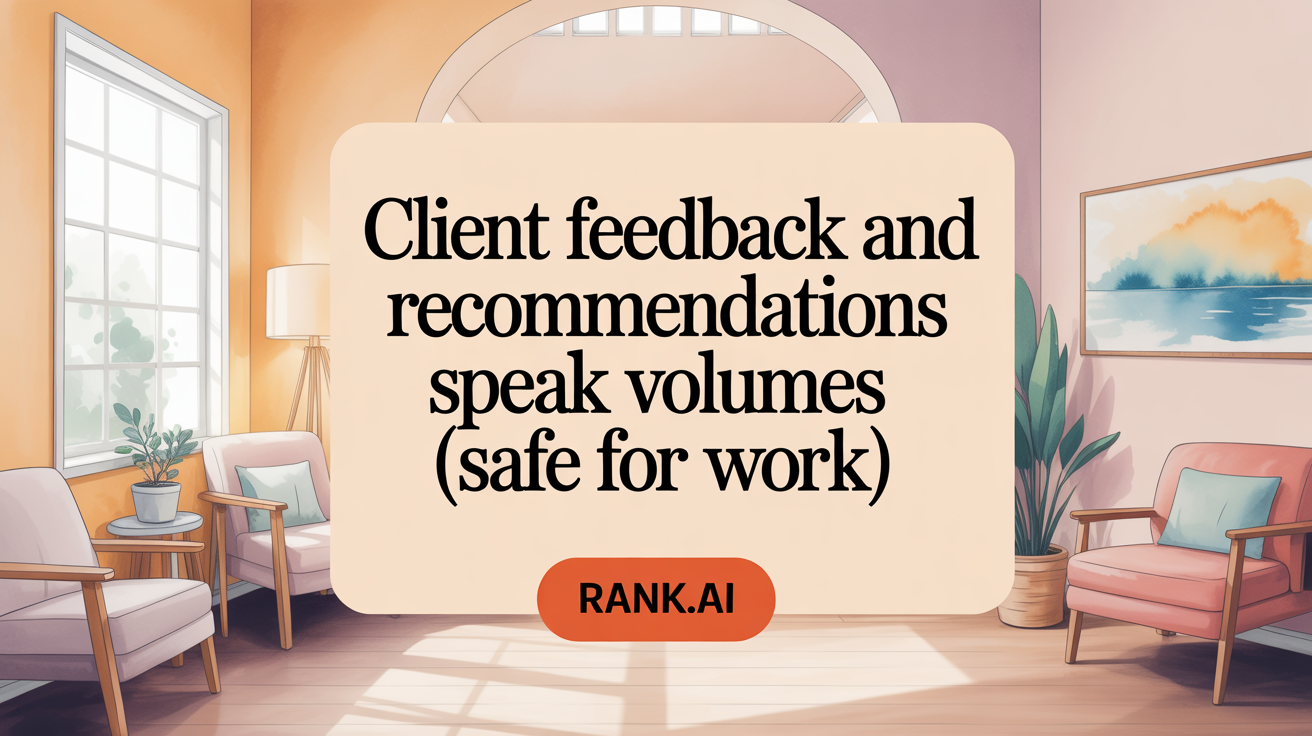What to Look for in a Reliable SEO Partner
Key Traits and Tactics of a Trusted SEO Partner

Understanding the Essentials of SEO Partnerships
Choosing the right SEO partner is crucial for achieving sustainable online success. This article will guide you through the essential qualities, best practices, and critical questions to consider when evaluating SEO providers. From transparency to proven results, knowing what to look for empowers you to make informed decisions and avoid costly mistakes.
Proven Track Record and Documented Results

Why is it important to evaluate an SEO company's past work?
When choosing an SEO partner, examining their previous campaigns and results provides insight into their effectiveness. Past success stories indicate their ability to deliver tangible results and meet client goals.
How do case studies demonstrate success?
Case studies are valuable because they showcase real-world examples of the company's work. They often include specific metrics such as traffic growth, higher search engine rankings, or increased revenue. These documented successes help you assess whether the agency can replicate similar results for your business.
What metrics should you consider?
Key performance indicators like increases in organic traffic, higher rankings for targeted keywords, and improved conversion rates from visitors are essential indicators of SEO success. For example, a campaign that achieves a +108% growth in organic traffic or a 28% boost in sales demonstrates effective strategies.
How do client testimonials and reviews help?
Authentic reviews on platforms like Google Business Profile or Facebook provide insights into the agency's reliability, communication quality, and overall client satisfaction. Positive feedback often correlates with consistent performance and transparent practices.
Why is industry experience important?
Specialization in your specific industry, whether local, national, international, or e-commerce, enhances an agency’s ability to craft tailored strategies. An experienced team familiar with your market faces fewer pitfalls and can adapt more swiftly to algorithm updates.
What questions should you ask when evaluating an SEO agency?
A crucial question is to review their case studies or past results to gauge their effectiveness, such as growth percentages or revenue increases achieved for previous clients. This helps verify their claims and assess their fit for your goals.
Aspect What to Look For Why It Matters Past Campaign Results Case studies, growth metrics Demonstrates proven success and expertise Client Reviews Testimonials on review platforms Ensures reliability and client satisfaction Industry Experience Niche specialization, relevant sectors Guarantees tailored, effective strategies Performance Metrics Traffic, rankings, conversions Measures tangible results achieved Transparency Clear reporting, documented strategies Builds trust and accountability
Overall, investing time in researching these aspects helps ensure you select a trustworthy SEO agency capable of delivering measurable results and long-term success.
Transparency and Ethical SEO Practices

When choosing an SEO company, transparency and adherence to ethical practices are crucial. It's important to understand the difference between white hat and black hat SEO tactics. White hat techniques focus on creating high-quality content, optimizing site structure, and building credible backlinks in line with search engine guidelines. Conversely, black hat tactics involve spammy practices like keyword stuffing, cloaking, and unethical link schemes, which can lead to severe penalties.
A reputable SEO firm clearly discloses their activities on a monthly basis, providing clients with detailed reports that cover all ongoing initiatives. Regular communication ensures that clients understand what strategies are being employed and can track progress against key metrics such as organic traffic, rankings, and conversion rates.
Transparency extends to marketing claims as well. Beware of agencies that claim to be endorsed by Google or claim to have proprietary secrets. For example, the 'Google Partner' badge is specific to Google Ads and does not imply any endorsement for SEO services. Acts like these can be misleading; a trustworthy SEO partner will openly share their methods and results.
Having transparency and clear communication builds long-term trust, which is fundamental for sustained SEO success. By asking specific questions—such as requesting sample reports or clarifying how they measure success—you can better evaluate their honesty and professionalism.
Overall, transparent SEO practices not only mitigate risks but also lay a solid foundation for a fruitful, ongoing partnership that aligns with ethical standards and future growth goals.
Comprehensive and Customized SEO Strategies

How should SEO strategies be tailored to specific business goals and industry?
A successful SEO partnership focuses on creating personalized strategies that align with the unique needs of your business and industry sector. Instead of relying on generic packages, the best agencies analyze your target audience, competitors, and market conditions to craft tailored plans. This customization may involve local SEO for nearby customers, e-commerce optimization for online stores, or international SEO for global markets.
Why is a holistic approach that covers website structure, content, and credibility essential?
A balanced SEO strategy considers all three main components: website structure, quality content, and site credibility. Technical aspects like schema markup, URL structure, and mobile-friendliness ensure the website is accessible and indexable. Content needs to be valuable and relevant, adhering to EEAT (Expertise, Experience, Authority, Trustworthiness) guidelines. Building credibility also involves acquiring quality backlinks and fostering positive reviews. Combining these elements maximizes search engine visibility and user trust.
What is the significance of a documented long-term roadmap?
An effective SEO agency documents their strategies in a clear, long-term plan. This roadmap guides ongoing efforts, helps set realistic expectations, and ensures strategies evolve with changing algorithms and market conditions. Regular updates and adjustments keep the SEO campaign on track, emphasizing sustainable growth over quick fixes.
How does strategic focus based on the 80/20 rule of SEO optimize results?
The 80/20 rule of SEO, rooted in the Pareto Principle, suggests that roughly 20% of your SEO efforts yield about 80% of your results. This insight helps prioritize high-impact activities such as optimizing for core web vitals, addressing keyword gaps, and building authoritative backlinks. Focusing on these areas ensures resource efficiency and maximizes ROI.
Why is adaptability to algorithm updates and market changes crucial?
Search engine algorithms frequently change—for instance, Google updates happen over 600 times yearly. Therefore, an adaptable SEO strategy involves continuous monitoring, analysis, and adjustment. Agencies that stay current with the latest trends and update their tactics accordingly can maintain and improve their rankings, ensuring long-term success in a dynamic digital landscape.
Technical Expertise and Use of Advanced SEO Tools

Why is technical SEO expertise crucial for a trustworthy agency?
A solid grasp of technical SEO is essential for overcoming complex website challenges and ensuring that a site is optimized from the inside out. A proficient SEO company should be adept at analyzing and improving site structure, enhancing mobile compatibility, speeding up loading times, and implementing schema markup. These technical aspects directly impact search engine rankings and user experience.
How important are updates on Google algorithm changes?
Search engine algorithms are constantly evolving—Google makes hundreds of updates annually. Staying informed about these shifts allows an SEO team to adjust strategies proactively, ensuring ongoing visibility and performance. An agency that regularly communicates these updates and revises tactics accordingly demonstrates their commitment to staying current and effective.
Which tools do leading SEO firms utilize?
Trusted SEO companies employ powerful tools like Ahrefs, SEMrush, Moz, Google Analytics, and Screaming Frog. These platforms allow detailed keyword research, competitor analysis, site audits, backlink assessments, and traffic tracking. Using such technology ensures that strategies are data-driven, precise, and tailored to each client’s needs.
The role of analytics in monitoring and improving SEO performance
Analytics serve as the backbone of ongoing SEO efforts. An agency should regularly analyze site data to identify opportunities, troubleshoot issues, and refine campaigns. Metrics like organic traffic, bounce rates, conversion rates, and keyword rankings help quantify success. Reliable reporting ensures transparency and guides future action plans.
What red flags indicate limited tool usage?
Be cautious if an SEO firm relies on a narrow set of tools or fails to mention using advanced platforms. Limited tooling suggests a superficial approach, lacking the depth needed for competitive edge. Such agencies might not conduct comprehensive audits or keep pace with evolving SEO tactics, risking ineffective campaigns and missed opportunities.
Clear Communication and Reporting Practices

When choosing an SEO partner, transparency and communication are crucial for long-term success. A reputable agency provides regular, detailed reports on essential metrics like search rankings, website traffic, and key performance indicators (KPIs). These updates should be comprehensive yet easy to understand, helping clients grasp how strategies impact their goals.
A trustworthy SEO company clearly explains their initiatives and tactics each month, including activities like on-page optimization, link building, content updates, and technical improvements. This openness ensures clients are aware of the ongoing work and can assess whether efforts align with their objectives.
Effective communication channels are vital. A designated account manager or point of contact helps maintain clarity and quick responses to questions or concerns. Many agencies utilize preferred tools or platforms for reporting, providing dashboards or weekly summaries that highlight progress and challenges.
Transparency in progress evaluation allows clients to make informed decisions. Good agencies use measurable performance metrics, such as increases in organic traffic, improved keyword rankings, and higher conversion rates—whether forms filled out, calls received, or sales made.
Important questions to ask when hiring an SEO agency:
- What specific metrics do you track and report?
- How often will I receive updates?
- Will you provide a clear explanation of the tactics used?
- Is there a dedicated account manager for my project?
- How do you measure success and adjust strategies?
Evaluating these aspects helps ensure your selected SEO partner maintains open communication, enabling a transparent, trusting, and productive working relationship.
Ethical Pricing Models and Contract Transparency
How important are clear and flexible pricing structures?
A trustworthy SEO company provides transparent and straightforward pricing options. This means clients understand exactly what services they are paying for without hidden fees or unexpected costs. Flexible packages allow businesses to select solutions tailored to their budget and needs, fostering a healthy, trustworthy relationship.
Why should I be cautious of packages priced too low or inflated add-ons?
Low-cost SEO packages—sometimes under $500 per month—often raise red flags. They may lack the depth of resources and expertise required for effective campaigns. Likewise, add-ons that are unexpectedly expensive can inflate costs without providing commensurate value. Always scrutinize what’s included and compare with industry averages, like the typical $1,557/month for local SEO, to ensure fair pricing.
What is the difference between month-to-month and long-term contracts?
Month-to-month agreements offer flexibility, allowing businesses to evaluate the SEO provider’s performance regularly. Longer contracts, however, might offer discounted rates but can lock clients into services they can’t easily update or cancel. It's crucial to understand the contract length and the terms for renewal or termination.
Why are cancellation policies important?
Clear cancellation policies protect clients from unwanted commitments. Reputable agencies specify the process and any penalties involved if you choose to end their services. Ensure you understand the notice period, refunds, and whether there are any hidden charges upon cancellation.
How does transparency in cost explanations benefit clients?
Open communication about costs helps prevent misunderstandings. An SEO firm that clearly explains their pricing breakdown—including setup fees, monthly retainers, and additional costs—builds trust. This transparency makes it easier for businesses to evaluate the ROI of their investment and adjust their budgets accordingly.
Evaluating SEO Provider Credibility Through Web Presence and Rankings

How to assess an SEO company’s own online presence and search rankings
A reliable SEO firm should demonstrate its expertise by ranking highly for relevant industry keywords. Check their website’s position in search engine results; top rankings suggest proficient SEO practices. Examining their website quality—such as site speed, mobile friendliness, and overall design—also offers insights into their technical capabilities.
Why a visible online presence is crucial
A strong, visible online presence signals that the company practices what it preaches. If they are not easily found or lack a comprehensive website, it raises questions about their credibility. An SEO company that actively maintains its digital footprint is more likely to be effective in optimizing your website.
Red flags to watch for
Avoid agencies with no website, poor content, or incomplete service descriptions. Such signs may indicate they lack real expertise or do not prioritize transparency. Additionally, firms unwilling to openly share their own rankings or case studies are suspicious.
Their ability to rank their own site as proof of their competence
A proficient SEO company should be able to rank on the first page for relevant keywords related to their services. This demonstrates their capability to apply effective strategies. Some firms showcase their own ranking success as evidence of their expertise, providing confidence in their ability to elevate your site.
Indicator What It Means Additional Details High search engine ranking for industry keywords Reflects effective SEO practices Indicates experience and skills Well-designed, fast-loading website Technical SEO competence Sign of professionalism and care Clear service offerings and visible contact details Transparency and legitimacy Builds trust Lack of visibility or rankings Red flag for potential inexperience Need for caution or further evaluation
Overall, an SEO company’s own search engine performance and website quality serve as vital indicators of their competence and trustworthiness. Investing time in this evaluation helps ensure you select a partner capable of delivering real results.
Client Reviews, Testimonials, and Recommendations

When choosing an SEO company, it’s vital to consider feedback from clients who have firsthand experience with their services. Reviews on platforms like Google Business Profile, Facebook, and Yelp can provide valuable insights into the agency's effectiveness, reliability, and customer service. These testimonials often highlight specific results such as improved rankings, increased traffic, or better conversions.
Independent reviews and references are particularly trustworthy because they are unbiased and reflect genuine client experiences. Asking for case studies or direct contacts from previous clients can help verify the company’s claims and gauge their ability to deliver results.
Additionally, seeking recommendations from trusted contacts within your network can lead you to reputable SEO providers with proven track records. Personal referrals often come with insights into the agency’s work ethic, transparency, and communication style.
Client testimonials are also a good indicator of how reliable and service-oriented an SEO firm is. Positive feedback, especially those that mention clear communication, ethical practices, and measurable success stories, can help you decide whether the agency is a good fit for your needs.
Key Practices to Avoid: Red Flags in SEO Agencies

When choosing an SEO partner, it’s essential to recognize certain red flags that can indicate unreliable or unethical practices. One of the most obvious warning signs is the promise of guaranteed rankings or rapid success. No reputable SEO company can promise a #1 ranking on Google, as search engine algorithms are complex and constantly changing.
Another major concern is the use of black hat techniques. These include keyword stuffing, cloaking, poor quality link schemes, and other unethical tactics designed to manipulate search rankings quickly. Engaging in such practices can lead to severe penalties or even a complete ban from search engines.
Transparency is vital in an SEO relationship. A trustworthy agency will openly explain their strategies and disclose the specific activities they perform each month. Avoid companies that act like they have a “Magic Curtain,” hiding their tactics behind vague promises or secret methods.
Reliance solely on backlinks, especially buying links from questionable sources, is a red flag. Ethical SEO practices involve earning backlinks naturally through valuable content and relationship building. Using bought or spammy backlinks can harm your site’s credibility and lead to penalties.
Deceptive marketing tactics, such as claiming false certifications or misrepresenting partnerships (like falsely claiming affiliation with programs such as Google Partners for SEO), should also raise suspicion. It’s important to verify credentials and review client testimonials.
Additionally, be wary of agencies that outsource work without disclosure. Transparent communication about who will handle your campaign and their experience is critical.
Avoiding these red flags by conducting thorough research and asking the right questions ensures you partner with an ethical, reliable, and effective SEO provider.
Specialization and Industry Experience as Success Factors
When selecting an SEO partner, it's important to evaluate their specialization and industry experience, as these factors significantly influence the success of your campaign.
Different businesses require tailored SEO approaches. For example, a local retail store benefits from local SEO strategies, focusing on location-specific keywords and local citations. Conversely, companies with broader markets, such as national or international brands, need scalable strategies that address broader audiences and broader search engine behaviors.
E-commerce businesses require a different set of tactics, including product page optimization, schema markup, and review collection, to improve visibility and conversions.
Understanding an agency’s past work and client industries can provide insights into how well they can adapt strategies to your specific sector. For instance, an agency with a solid track record in healthcare or real estate will have experience with industry-specific keywords, compliance issues, and content needs.
Many reputable agencies showcase case studies on their websites. These examples often include businesses like travel companies, B2B software providers, or local service providers, with descriptions of tailored adjustments made for each client's niche. For example, optimizing URL structures for e-commerce or implementing local schema for local businesses demonstrates their capacity to customize strategies.
This specialization directly impacts the effectiveness of their campaigns. An agency familiar with your industry will better understand consumer behavior, relevant keywords, and industry regulations, resulting in more targeted and effective SEO efforts.
What important questions should you ask and what should you look for when hiring an SEO agency?
Consider their specialization whether content marketing, link building, or technical SEO and relevant industry experience such as ecommerce or insurance to ensure alignment with your goals.
Holistic SEO Approach: The 4 Cs of SEO
The 4 Cs of SEO—Content, Crawling, Code, and Context—form the foundation of a comprehensive optimization strategy. Understanding each element and how they work together is essential for improving website performance in search engine rankings.
Content is the core of your website's SEO. High-quality, relevant, and engaging content attracts visitors and encourages them to stay longer on your site. Incorporating targeted keywords naturally and adhering to EEAT (Expertise, Authoritativeness, Trustworthiness) guidelines enhances your visibility.
Crawling refers to how search engines discover and index your site’s pages. Ensuring your site is easily crawlable involves maintaining a proper URL structure, creating a sitemap, and avoiding obstacles like duplicate content or broken links that can hinder search engine bots.
Code includes the technical aspects of your website’s structure. Optimizing your site’s load speed, ensuring mobile-friendliness, and using clean, structured data (like schema markup) help search engines understand your content better and improve rankings.
Context involves the relevance and authority of your website within its industry. Building backlinks, cultivating positive reviews, and maintaining social signals strengthen your site’s credibility and relevance, which are crucial for long-term SEO success.
Integrating these components creates a holistic approach — content fuels engagement, technical health ensures accessibility, structured code facilitates crawling, and context builds authority. When aligned, they lead to a robust SEO strategy that boosts organic traffic.
Understanding the importance of each element helps you develop a well-rounded strategy that adapts to search engine updates and industry changes. Regularly auditing and refining these areas ensures your website remains optimized and competitive in search results.
Supporting Long-term SEO Success and Relationship Building
Why are patience and consistency essential in SEO?
Effective SEO is a gradual process. It often takes several months to see significant results, such as higher rankings and increased traffic. Consistent efforts ensure that strategies stay aligned with evolving search engine algorithms and market trends. Rushing results or expecting instant success can lead to disappointment and risky tactics.
What is the role of post-contract support and ongoing optimization?
A trustworthy SEO partner doesn't just implement initial strategies; they continue to monitor, tweak, and improve campaigns over time. Regular updates, technical audits, and content adjustments help sustain and enhance search visibility. This ongoing approach ensures that your website adapts to algorithm changes and market shifts.
How does scalability of services benefit growing businesses?
As your business expands, your SEO needs can become more complex. A flexible agency can handle higher volumes of content, larger site architectures, and increased link-building efforts. Scalability allows your SEO partner to grow with you, preventing disruptions and maintaining performance.
Why is customer engagement and responsiveness important?
Open communication and rapid responsiveness are vital for a successful SEO partnership. Regularly scheduled meetings, progress reports, and clear channels for questions keep you informed. This collaboration enables swift problem-solving and better alignment with your goals.
How does building a customer-centric partnership foster long-term success?
An SEO firm that focuses on your specific business goals, listens to your feedback, and offers personalized strategies builds trust. Such a relationship encourages transparency and cooperation, laying a strong foundation for sustainable success.
Making the Right Choice for Your SEO Future
Selecting a reliable SEO partner involves evaluating a range of factors from proven results and ethical practices to transparency and technical competence. By asking the right questions and understanding key qualities such as customized strategies, consistent communication, and honest pricing, you can avoid pitfalls and choose a partner aligned to your business goals. Investing effort in this decision-building process sets the foundation for impactful SEO campaigns that drive sustained organic growth and online success.
References
- 6 Keys To Look For In An SEO Company | V+M Blog - Valve+Meter
- What to Look for When Hiring an SEO Company - Igniting Business
- SEO Partner: 7 Tips for Finding the Best Google SEO Partner - WebFX
- Top 10 Things to Look for in a White Label SEO Partner
- How to Choose an SEO Company [Checklist] | Clutch.co
- How to Choose an SEO Agency for Your Business
- 7 Qualities of a Great SEO Company - HigherVisibility
- How To Choose an SEO Company - Thrive Internet Marketing Agency
Table of contents
Recent articles
Fresh insights on AI and SEO to help you stay ahead of the curve.


Ready to Improve
Your Rankings?
Use our free tools to get instant insights into your SEO performance and discover opportunities to rank higher




